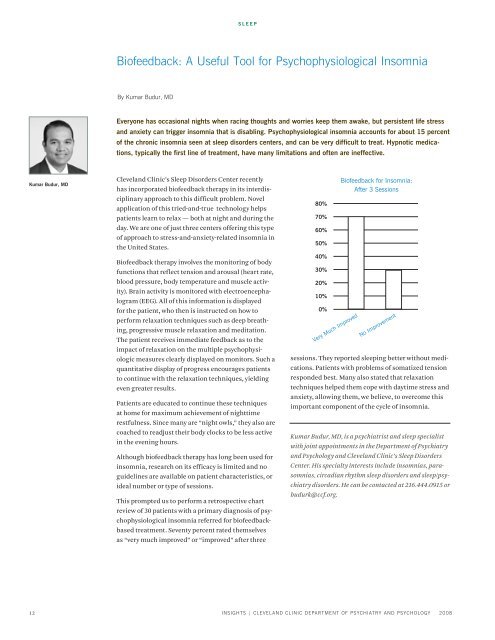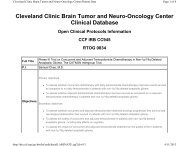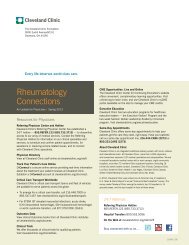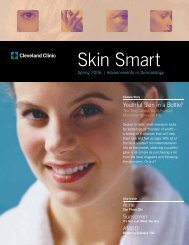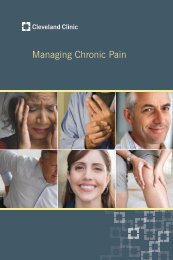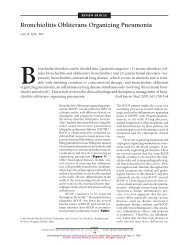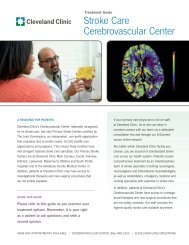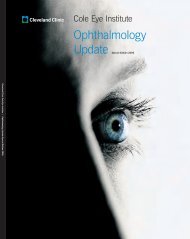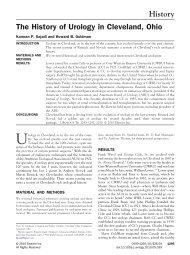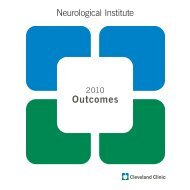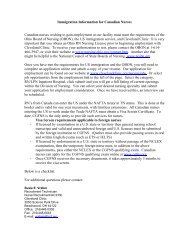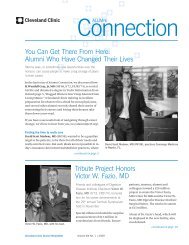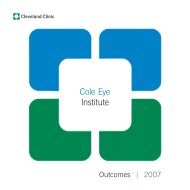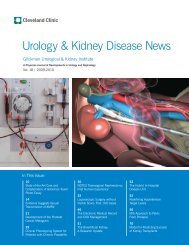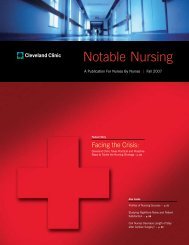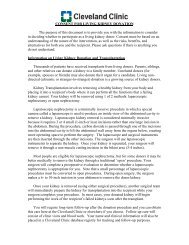Insights - Cleveland Clinic
Insights - Cleveland Clinic
Insights - Cleveland Clinic
You also want an ePaper? Increase the reach of your titles
YUMPU automatically turns print PDFs into web optimized ePapers that Google loves.
Kumar Budur, md<br />
Biofeedback: a Useful tool for psychophysiological Insomnia<br />
By Kumar Budur, md<br />
sleep<br />
everyone has occasional nights when racing thoughts and worries keep them awake, but persistent life stress<br />
and anxiety can trigger insomnia that is disabling. psychophysiological insomnia accounts for about 15 percent<br />
of the chronic insomnia seen at sleep disorders centers, and can be very difficult to treat. hypnotic medications,<br />
typically the first line of treatment, have many limitations and often are ineffective.<br />
<strong>Cleveland</strong> <strong>Clinic</strong>’s Sleep Disorders Center recently<br />
has incorporated biofeedback therapy in its interdisciplinary<br />
approach to this difficult problem. Novel<br />
application of this tried-and-true technology helps<br />
patients learn to relax — both at night and during the<br />
day. We are one of just three centers offering this type<br />
of approach to stress-and-anxiety-related insomnia in<br />
the United States.<br />
Biofeedback therapy involves the monitoring of body<br />
functions that reflect tension and arousal (heart rate,<br />
blood pressure, body temperature and muscle activity).<br />
Brain activity is monitored with electroencephalogram<br />
(EEG). All of this information is displayed<br />
for the patient, who then is instructed on how to<br />
perform relaxation techniques such as deep breathing,<br />
progressive muscle relaxation and meditation.<br />
The patient receives immediate feedback as to the<br />
impact of relaxation on the multiple psychophysiologic<br />
measures clearly displayed on monitors. Such a<br />
quantitative display of progress encourages patients<br />
to continue with the relaxation techniques, yielding<br />
even greater results.<br />
Patients are educated to continue these techniques<br />
at home for maximum achievement of nighttime<br />
restfulness. Since many are “night owls,” they also are<br />
coached to readjust their body clocks to be less active<br />
in the evening hours.<br />
Although biofeedback therapy has long been used for<br />
insomnia, research on its efficacy is limited and no<br />
guidelines are available on patient characteristics, or<br />
ideal number or type of sessions.<br />
This prompted us to perform a retrospective chart<br />
review of 30 patients with a primary diagnosis of psychophysiological<br />
insomnia referred for biofeedbackbased<br />
treatment. Seventy percent rated themselves<br />
as “very much improved” or “improved” after three<br />
sessions. They reported sleeping better without medications.<br />
Patients with problems of somatized tension<br />
responded best. Many also stated that relaxation<br />
techniques helped them cope with daytime stress and<br />
anxiety, allowing them, we believe, to overcome this<br />
important component of the cycle of insomnia.<br />
Kumar Budur, MD, is a psychiatrist and sleep specialist<br />
with joint appointments in the Department of Psychiatry<br />
and Psychology and <strong>Cleveland</strong> <strong>Clinic</strong>’s Sleep Disorders<br />
Center. His specialty interests include insomnias, parasomnias,<br />
circadian rhythm sleep disorders and sleep/psychiatry<br />
disorders. He can be contacted at 216.444.0915 or<br />
budurk@ccf.org.<br />
12 INsIghts | ClEvElaNd ClINIC dEpartmENt of psyChIatry aNd psyChology 2008<br />
80%<br />
70%<br />
60%<br />
50%<br />
40%<br />
30%<br />
20%<br />
10%<br />
0%<br />
Very Much Improved<br />
Biofeedback for Insomnia:<br />
After 3 Sessions<br />
no Improvement


